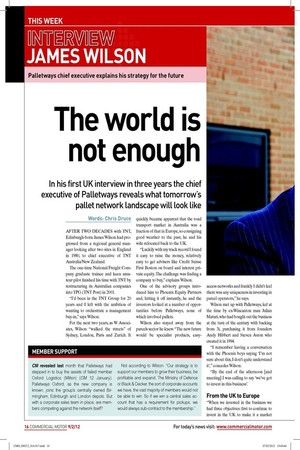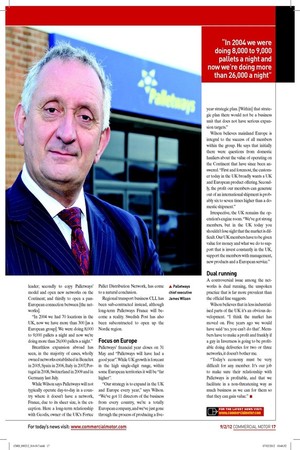JAMES WILSON
Page 11

Page 12

If you've noticed an error in this article please click here to report it so we can fix it.
Palletways chief executive explains his strategy for the future
The world is not enough
In his first UK interview in three years the chief executive of Palletways reveals what tomorrow’s pallet network landscape will look like
Words: Chris Druce
AFTER TWO DECADES with TNT, Edinburgh-born James Wilson had progressed from a regional general manager looking after two sites in England in 1980, to chief executive of TNT Australia/New Zealand.
The one-time National Freight Company graduate trainee and keen amateur pilot inished his time with TNT by restructuring its Australian companies into TPG (TNT Post) in 2001.
“I’d been in the TNT Group for 20 years and I left with the ambition of wanting to orchestrate a management buy-in,” says Wilson.
For the next two years, as W Associates, Wilson “walked the streets” of Sydney, London, Paris and Zurich. It quickly became apparent that the road transport market in Australia was a fraction of that in Europe, so consigning good weather to the past, he and his wife relocated back to the UK.
“Luckily with my track record I found it easy to raise the money, relatively easy to get advisers like Credit Suisse First Boston on board and interest private equity. The challenge was inding a company to buy,” explains Wilson.
One of the advisory groups introduced him to Phoenix Equity Partners and, hitting it off instantly, he and the investors looked at a number of opportunities before Palletways, none of which involved pallets.
Wilson also stayed away from the parcels sector he knew. “The new future would be specialist products, easy access networks and frankly I didn’t feel there was any uniqueness in investing in parcel operators,” he says.
Wilson met up with Palletways, led at the time by ex-Wincanton man Julian Maturi, who had bought out the business at the turn of the century with backing from 3i, purchasing it from founders Andy Hibbert and Steven Aston who created it in 1994.
“I remember having a conversation with the Phoenix boys saying ‘I’m not sure about this, I don’t quite understand it’ , ” concedes Wilson.
“By the end of the afternoon [and meeting] I was calling to say ‘we’ve got to invest in this business’ .
From the UK to Europe
“When we invested in the business we had three objectives: irst to continue to invest in the UK to make it a market leader; secondly to copy Palletways’ model and open new networks on the Continent; and thirdly to open a panEuropean connection between [the networks].
“In 2004 we had 70 locations in the UK, now we have more than 300 [as a European group]. We were doing 8,000 to 9,000 pallets a night and now we’re doing more than 26,000 pallets a night.” Breathless expansion abroad has seen, in the majority of cases, wholly owned networks established in Benelux in 2005, Spain in 2006, Italy in 2007, Portugal in 2008, Switzerland in 2009 and in Germany last July.
While Wilson says Palletways will not typically operate day-to-day in a country where it doesn’t have a network, France, due to its sheer size, is the exception. Here a long-term relationship with Geodis, owner of the UK’s Fortec Pallet Distribution Network, has come to a natural conclusion.
Regional transport business CLL has been sub-contracted instead, although long-term Palletways France will become a reality. Swedish Post has also been subcontracted to open up the Nordic region.
Focus on Europe
Palletways’ inancial year closes on 31 May and “Palletways will have had a good year”. While UK growth is forecast in the high single-digit range, within some European territories it will be “far higher”.
“Our strategy is to expand in the UK and Europe every year,” says Wilson. “We’ve got 11 directors of the business from every country, we’re a totally European company, and we’ve just gone through the process of producing a ive
year strategic plan. [Within] that strategic plan there would not be a business unit that does not have serious expansion targets.” Wilson believes mainland Europe is integral to the success of all members within the group. He says that initially there were questions from domestic hauliers about the value of operating on the Continent that have since been answered. “First and foremost, the customer today in the UK broadly wants a UK and European product offering. Secondly, the proit our members can generate out of an international shipment is probably six to seven times higher than a domestic shipment.” Irrespective, the UK remains the operation’s engine room. “We’ve got strong members, but in the UK today you shouldn’t lose sight that the market is dificult. Our UK members have to be given value for money and what we do to support that is invest constantly in the UK, support the members with management, new products and a European service.”
Dual running
A controversial issue among the networks is dual running, the unspoken practice that is far more prevalent than the oficial line suggests.
Wilson believes that in less industrialised parts of the UK it’s an obvious development. “I think the market has moved on. Five years ago we would have said ‘no, you can’t do that’ . Members have to make a proit and frankly if a guy in Inverness is going to be proitable doing deliveries for two or three networks, it doesn’t bother me.
“Today’s economy must be very dificult for any member. It’s our job to make sure their relationship with Palletways is proitable, and that we facilitate in a non-threatening way as much business as we can for them so that they can gain value.” n
MEMBER SUPPORT
CM revealed last month that Palletways had stepped in to buy the assets of failed member Oxford Logistics (Milton) (CM 12 January). Palletways Oxford, as the new company is known, joins the group’s centrally owned Birmingham, Edinburgh and London depots. But with a corporate sales team in place, are members competing against the network itself? Not according to Wilson: “Our strategy is to support our members to grow their business, be profitable and expand. The Ministry of Defence or Black & Decker, the sort of corporate accounts we have, the vast majority of members would not be able to win. So if we win a central sales account that has a requirement for pickups, we would always sub-contract to the membership.”











































